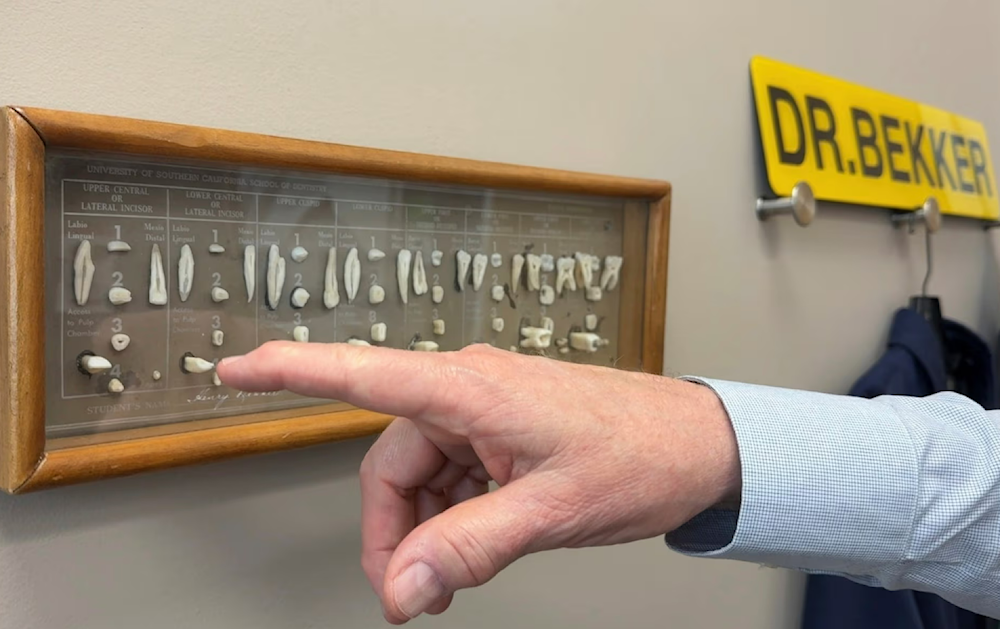Utah becomes first US state to ban fluoride in public drinking water
Utah bans fluoride in public water, sparking backlash from dentists who warn of rising child tooth decay and limited access to preventive dental care.
-

Dentist James Bekker with dissected human teeth on 30 April 2025, at his office in Salt Lake City, Utah. (Hannah Schoenbaum/AP)
Utah is set to become the first state in the US to ban fluoride in public drinking water, a move that has sparked concern among dentists and public health officials who warn it will lead to a surge in tooth decay, especially among vulnerable children and low-income families.
Governor Spencer Cox signed the measure into law despite widespread opposition from dental professionals and national health organizations. The law takes effect Wednesday and will impact an estimated 1.6 million people in Salt Lake City and northern Utah who currently receive fluoridated water.
Last week, the Associated Press (AP) reported that Florida is poised to become the second state to ban fluoride in public drinking water, with Ohio and South Carolina legislatures considering similar measures.
The bill, sponsored by Republican Representative Stephanie Gricius, ends the practice of fluoridating public water supplies. While Gricius acknowledged fluoride's benefits, she argued that residents should not be given it without informed consent. Governor Cox echoed this sentiment, claiming there is no measurable difference in health outcomes between communities with and without fluoride, a claim Utah dentists strongly dispute.
“Any dentist can look in someone’s mouth in Utah and tell exactly where they grew up. Did you grow up in a fluoridated area or a non-fluoridated area? We can tell by the level of decay,” said Dr. James Bekker, a pediatric dentist at the University of Utah.
Dentists fear surge in child tooth decay and unmet dental needs
Providers at Salt Lake Donated Dental Services, a clinic offering free or low-cost dental care, say they are already overwhelmed and expect their waitlist for children’s procedures to grow significantly.
“We’re scheduling into August and September for some two-, three-, four-year-olds that are in so much pain that they can’t eat properly,” said Sasha Harvey, the clinic’s executive director. “It’s heartbreaking, and it’s going to get worse.”
Many patients were unaware that their water contained fluoride or that the ban was imminent. “I did not know about a ban,” said Noe Figueroa, a patient at the clinic. “Well, that’s not good. I don’t think that’s good at all.”
Most patients at the clinic only seek help when pain becomes unbearable, and many cannot afford fluoride supplements or routine dental visits. Harvey noted that the law places the burden of oral health on individuals, even as systemic barriers to care persist.
Fluoride’s role in public health and why it matters
Fluoridation has been recognized by the Centers for Disease Control and Prevention (CDC) as one of the greatest public health achievements of the 20th century. Supplementing low natural fluoride levels in water to reach the recommended 0.7 mg/L strengthens teeth and reduces cavities, especially for children whose teeth are still developing. For low-income families, fluoridated water may be their only form of preventive dental care.
Bekker emphasized that fluoride toothpaste alone is not enough. “When a person regularly ingests fluoridated water, their saliva bathes the teeth in fluoride throughout the day and makes them stronger,” he said.
The ban has received support from US Health Secretary Robert F. Kennedy Jr., who applauded Utah’s decision and said he plans to direct the CDC to end its recommendation for nationwide fluoridation. Florida is considering a similar measure, and legislatures in Ohio and South Carolina are reviewing fluoride bans as well.
Some proponents cited studies linking high fluoride exposure to health risks and lowered IQ in children. However, the National Institutes of Health has stated that it is “virtually impossible” to receive a toxic dose of fluoride at levels used in public water systems.
Kennedy’s support signals a broader political push against public fluoridation, despite longstanding scientific consensus on its safety and efficacy. If other states follow Utah’s lead, the country could see a rollback of a practice long regarded as central to dental health equity.
With fluoride tablets requiring a prescription, and few over-the-counter options currently available, many Utah families may struggle to replace the protection once provided by public water. Bekker and other providers are working to expand access to fluoride supplements, but regulatory changes may take months or years.
As the law takes effect, healthcare providers brace for the consequences and warn that the real cost will be borne by those least able to afford it.

 5 Min Read
5 Min Read








